Melding Music and Magic
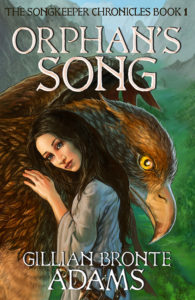 Have you ever listened to a song so powerful it brought tears to your eyes? Or heard a melody so strong it set your heart pumping and stirred your limbs to action? Music forms an integral part of my novel Orphan’s Song, so naturally, I wish I could claim credit for first dreaming up the concept of blending music and magic and powerful songs in fantasy.
Have you ever listened to a song so powerful it brought tears to your eyes? Or heard a melody so strong it set your heart pumping and stirred your limbs to action? Music forms an integral part of my novel Orphan’s Song, so naturally, I wish I could claim credit for first dreaming up the concept of blending music and magic and powerful songs in fantasy.
But I can’t.
Honesty chains my tongue.
The “greats” beat me to it, not to mention the authors since their day who have penned novels with powerful music forming anything from a side-note to a central piece of the story. To which “greats” do I refer? I’m talking, of course, about Tolkien and Lewis — probably two of the most oft-quoted fantasy authors in the history of mankind … and elvenkind … and talking animalkind.
(I realize that I risk being relegated to the realm of the stereotypical when I admit Tolkien and Lewis were some of the authors who shaped my early reading and writing years, but once again honesty, right?)
 From the first moment I picked up The Silmarillion, I was captivated by the story. But when I stumbled across the following snippet from the Lay of Leithian, the words seized me by the throat and refused to let go. Like Beren at the first sight of Luthien, I stood as one under a spell.
From the first moment I picked up The Silmarillion, I was captivated by the story. But when I stumbled across the following snippet from the Lay of Leithian, the words seized me by the throat and refused to let go. Like Beren at the first sight of Luthien, I stood as one under a spell.
Then sudden Felagund there swaying
Sang in answer a song of staying,
Resisting, battling against power,
Of secrets kept, strength like a tower,
And trust unbroken, freedom, escape;
Of changing and of shifting shape,
Of snares eluded, broken traps,
The prison opening, the chain that snaps.— The Silmarillion, J.R.R. Tolkien
I was held captive by the hypnotic cadence, enthralled by the force of the lyrical words, and fascinated with the concept of the “songs of power” with which Felagund and Sauron fought.
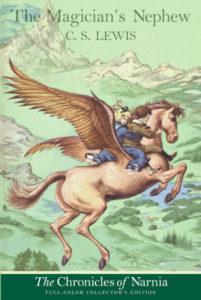 Another powerful song makes its appearance when Luthien sings a deep sleep over all of Angband, enabling the heist of the Silmaril from Morgoth’s crown. And in Lewis’s The Magician’s Nephew, music summons the dawning of a world when Aslan sings Narnia to life.
Another powerful song makes its appearance when Luthien sings a deep sleep over all of Angband, enabling the heist of the Silmaril from Morgoth’s crown. And in Lewis’s The Magician’s Nephew, music summons the dawning of a world when Aslan sings Narnia to life.
The Lion was pacing to and fro about that empty land and singing his new song. It was softer and more lilting than the song by which he had called up the stars and the sun; a gentle, rippling music. And as he walked and sang, the valley grew green with grass.
— The Magician’s Nephew, C.S. Lewis
Beautiful, isn’t it?
But what about more recent fantasy—does music make an appearance there as well?
In recent years, the realm of Christian speculative fiction has seen the Wingfeather Saga by Andrew Peterson where the songs of the ancient stones possess the power to transform and those of the Songmaiden are powerful. Or D. Barkley Briggs’s Legends of Karac Tor series where one of the characters has the ability to play the powerful “song of Aion.”
There are other speculative fiction titles I have discovered—in both the Christian and secular markets—that utilize music or melody or songs of power in some unique way.
Naturally, it set me to wondering, “Why music?”
What was it about music that drew me and these other authors to write it into our storyworlds? I pondered the question for some time before settling on what I think is the answer. A remarkably simple answer, actually.
I think it is because music possesses an undeniable power. As with the written word, the combining and blending of notes and rhythms offers endless possibility and carries the ability to strike at the hearts of all who listen—to both convey and produce emotion. The ability of music to sway the heart is something most people would acknowledge. Because of that, envisioning music as magic doesn’t require a great leap of the imagination on the reader’s part. It is hardly more than a child’s step.
Because the power of music is something most readers have experienced, when it is portrayed in fantasy, it is understandable, relatable, and resonates deep within the soul.
If that’s not magic, I don’t know what is.
Deep below, a sepulchral rumbling from the depths of the earth—a distant melody—rose to greet her. Warm as a summer sunrise, the song caught her up in its embrace. The tears dried on her face. Her sorrow eased. The song was familiar—she had known it all her life—and yet new and wondrous, something too great to be fully known or understood. It spiraled upward, carrying her soul to reach for the sky.
— Orphan’s Song, Gillian Bronte Adams
Have you read a novel where music and magic became one? Why do you think music is often portrayed as powerful?


































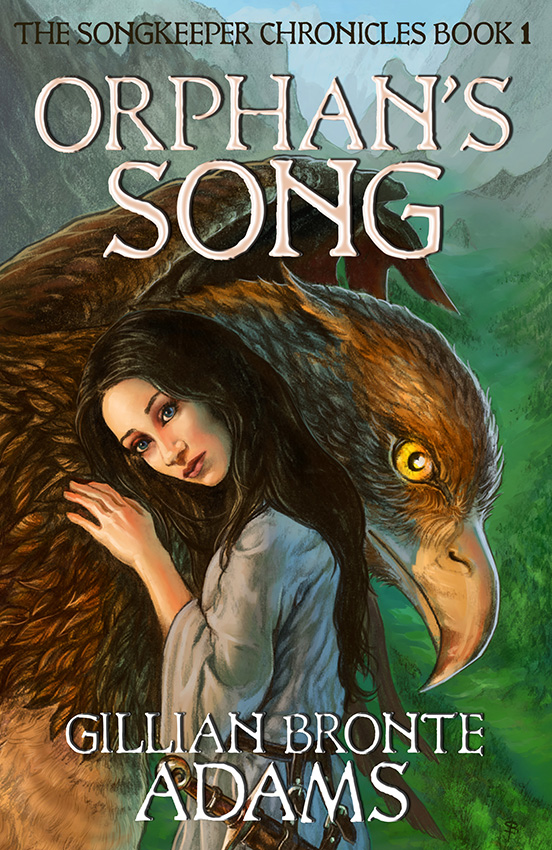
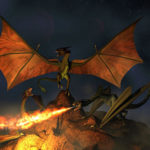
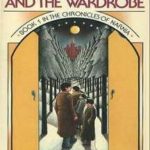
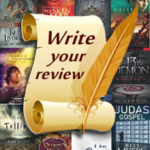




Music has a physical effect on our brains, that’s why it’s so powerful. Terry Brooks wrote a novel called Wishsong of Shannara. Fabulous mixture of song and magic. It’s an older novel, but I like his older books better than his newer ones.
Oh, I’ll have to look that one up. Thanks for sharing. I hadn’t heard of it before.
Definitely – it’s worth the read. Keep in mind it’s older, so he’s not writing with all the “trends” of today. But it’s still a great book. My favorite is the one before Wishsong: The Elfstones of Shannara. This book made me want to write fantasy. And the one before that is The Sword of Shannara. It’s pretty loaded with narrative and moves really slow, but it’s an interesting concept. You can read Elfstones without having to have read Sword. But I think you’ll appreciate Wishsong better if you read Elfstones first.
Great article Gillian! I love what Peter Kreeft says about music in The Philosophy of Tolkien:
“Music is not ornamented poetry, and poetry is not ornamented prose. Poetry is fallen music, and prose is fallen poetry.”
He elaborates that poetry is “music made speakable.” Of course, anyone who has read Tolkien’s epic tale knows what Dr. Kreeft is talking about. One of my fondest memories is of my oldest son, who spoke and read early, reading The Lord of the Rings to us. It, indeed, was like a song!
That is a lovely way of looking at music, poetry, and prose. Whenever I’m in the editing process, I have to read my sentences out loud, and I will rework and rewrite until they have just the right “lyrical” quality and sound that I’m looking for. And I love when I can tell that other writers have done the same!
I am not a huge poetry reader, but I do love Tolkien’s poems, and every now and then, I have the urge to search out and read some epic ballad.
Indeed, indeed! Music apart of magic is a concept that has greatly appealed to me as of late. I was quite delighted when Orphan’s Song included it so beautifully!
It’s so fascinating that both Tolkien and Lewis created their worlds from singing. You awakened my inner geek quoting that bit from the song battle between Felagund and Sauron. That’s one of my favorite parts ever.
I was all ready to point out The Wingfeather Saga as another music series, but you beat me to it! Goldstone Wood also has powerful music, especially the Song of the Spheres. But I can’t think of any others at the moment…
Yes, I love the battle between Felagund and Sauron and essentially the entire tale of Beren and Luthien, not to mention the rest of the Silmarillion. It’s a scene I would both love and hate to see in movie form, because it would be amazing to see someone try to envision it and terrible because they would probably not envision it the same way I do.
Thanks for mentioning the Tales of Goldstone Woods! Those are amazing and I do love the concept of the Song of the Spheres.
I just read “Cart and Cwidder,” by Diana Wynne Jones, which also features music as magic, but only when the magic harp-thing is played by one who is both speaking the truth with his music, and doing so confidently in the knowledge that it is the truth that he’s singing.
I skip over the songs in Tolkien. I’m the sort of music listener who pays more attention to the tones than the words, so written lyrics are just poetry to me, and I’m not much of a poetry person.
So, to me the sort of story that makes music integral to it is not the sort that should be written. It should be a musical, an opera, a movie, an anime.
Take this scene from Evangelion, despite that awful, awful dub. You couldn’t get on paper that horror-tinged affect the Hallelujah Chorus gives:
https://youtu.be/weK5m6Jn0zY
I love this. Great article, Gillian. Music has a magically quality about it, so why not turn it into something that can accomplish magical things?
I’ve always loved the concept. As a matter of fact, I was working on a fantasy series where music (not just singing, but all types of music) was the foundation for magic.
“Music has a magically quality about it, so why not turn it into something that can accomplish magical things?”
With you a hundred percent. It’s a concept I’ve always enjoyed as well, so I think that sounds like fascinating groundwork for a story.